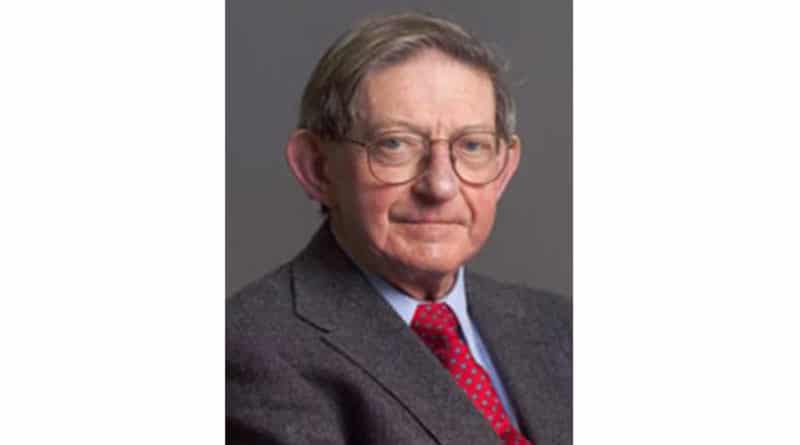Solid-Modeling Pioneer Herb Voelcker Dies at 90
Herb Voelcker, professor emeritus of engineering and a pioneer in solid modeling, the technology that enabled early computer-aided design (CAD), died Jan. 23 in Ithaca. He was 90.
Voelcker joined the Sibley School of Mechanical and Aerospace Engineering as the Charles W. Lake Jr. Professor of Engineering in 1986. By then, Voelcker had taught electrical engineering at the University of Rochester for 24 years, worked for the National Science Foundation, served in the U.S. Army Signal Corps and, as a member of the U.S. Army Rifle team, competed in the 1956 Olympic Games in Melbourne, Australia.
Throughout his 60-year career, Voelcker moved seamlessly between mechanical and electrical engineering. His interests ranged from radio wave propagation and bandwidth compression, to digital signal processing, to computer science, to mechanical design.
Voelcker grew up in Tonawanda, New York, on the Niagara River, where he developed dual interests – boating and building things – that would last the rest of his life. He aspired to be a naval officer and even received an appointment to the U.S. Naval Academy, but he failed the eye exam. Instead, he attended the Massachusetts Institute of Technology with the goal of studying naval architecture, only to be persuaded by MIT’s mechanical engineers to broaden his major.
He graduated in 1951 with a bachelor’s in mechanical engineering and joined the U.S. Army Signal Corps, serving with the 82nd Airborne Division as first lieutenant for two years.
“The army decided after a while I should become an electrical engineer because I was one of the few people who could drop a 50-pound radio from a bungee cord and parachute and have the thing still working after we all landed on the ground,” he said in a 2013 interview with emeritus professor Francis C. Moon.
Voelcker returned to MIT and received his master’s degree in electrical engineering in 1954. He was then posted to the U.S. Army’s Signal Labs at Fort Monmouth, New Jersey. In addition to boating and building, Voelcker was an expert marksman, having captained MIT’s rifle team while an undergraduate. The army leadership encouraged him to join the U.S. Army Rifle team, and Voelcker was on the team that won the 1952 national team championship. He also won the Leech Cup for high-power rifle shooting in 1954.
In 1956, he competed in the 300-meter rifle event at the Olympic Games in Melbourne, Australia, finishing 10th in a field of 20. Years later, Voelcker recounted how the experience forced him to decide whether he would devote his life to shooting in order to stay competitive at the world-class level.
“I basically hung up my rifles,” he said in 2013, “and haven’t fired a shot since.”
Two years after the Olympics, Voelcker received a Fulbright Fellowship. He resigned his commission as a captain and moved with his wife, Jean, to London, where he studied electrical engineering at the Imperial College of Science, earning his doctorate in 1961.
Upon graduation, Voelcker was hired by the University of Rochester as an assistant professor of electrical engineering. In 1972, he founded and led the Production Automation Project, which developed the mathematical foundations and core algorithms for solid modeling. This technology enabled mechanical CAD, the now-ubiquitous design tool used in everything from architecture to aerospace manufacturing.
In 1985, Voelcker was tapped by the National Science Foundation to lead a new directorate for advanced manufacturing technologies in Washington, D.C. After his one-year appointment ended, he came to Cornell, where he taught in the Sibley School of Mechanical and Aerospace Engineering until his retirement in 2000.
As emeritus professor, Voelcker continued to be an active member of his department, attending faculty meetings and teaching one class a year, most recently “Dimensional Tolerancing in Mechanical Design” in spring 2019.
“Even many years after his retirement, he was still actively teaching in the department, and teaching something that’s very important,” said David Erickson, the department’s S.C. Thomas Sze Director. “It’s something that’s applied and in large demand by our students. I think part of his contribution has always been to ensure that our students learn the strong fundamentals from an applied perspective.”
Voelcker was also a welcome presence at faculty meetings.
“He was still attending our faculty meetings right up until recently,” Erickson said. “When he spoke, people listened. He was always the reasonable person who would have steady, well-thought-out comments.”
Voelcker was a life fellow of the Institute for Electrical and Electronics Engineers and of the American Society of Mechanical Engineers (ASME). He received a lifetime achievement award in 2014 for his work in industrial automation from ASME’s Computers in Information in Engineering division.
He is survived by wife Jean, two sons and a sister.

